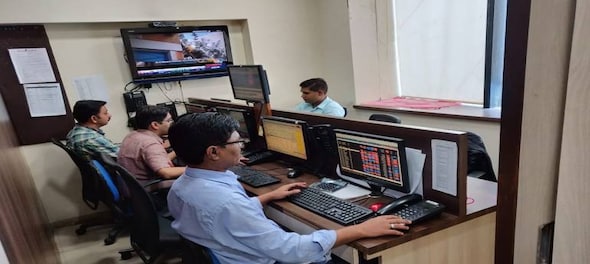
The Nifty March futures on Friday were quoting at nearly a 200-point discount, before the discount reduced to 80 points as the market rebounded a bit. Typically, futures always quote at a premium to spot, to reflect the cost of carrying forward the position.
CNBC-TV18 analysts Nigel D’Souza and Mangalam Maloo explain this situation as well as the broad foreign institutional investor activity in the futures and options market.
Q: Why are Nifty futures quoting at a discount to spot?
There are two reasons for this.
a) Heavy selling by foreign investors
FIIs have been heavily short selling the index futures. In terms of their portfolio mix, it has been an 80:20 ratio in favour of short positions. Unless the sale position is a hedge against shares sold in the cash market, selling of index futures reflects a bearish outlook on the market.
When the selling is ferocious, like has been the case over the last few days, the number of buyers reduce. This sometimes causes the futures price to quote at a discount to spot.
b) Dividend
It’s the end of the year, and usually many Nifty companies pay out dividends to shareholders on a half yearly or on a yearly basis. Just like stocks go ex-dividend after the dividend date, future prices reflect the ex-dividend price even before the dividend date. Till the time the stock goes ex-dividend, it may seem as though the futures are quoting at a discount.
Q: Is there anyway I can do an arbitrage trade on this?
Technically yes, but only the big institutional investors can do this because you will need sophisticated software for that. The regular cash-futures arbitrage is to sell the futures and buy the spot, since futures mostly trade at a premium to spot. On expiry day when the prices converge, the trader reverses both legs of the trade. When the futures are at a discount, you can do reverse arbitrage, as in you can buy the spot and sell the futures.
This is not so complicated if you are dealing in single stock futures. But when you are doing a reverse arbitrage in Nifty, you will need to sell a basket of Nifty stocks and buy the futures that are quoting at a discount. Also, the difference between the spot and futures prices should be wide enough to be able to make a decent profit net of transaction costs.
If you have a basket of Nifty stocks, you could do the trade easily. Most large institutions do have an inventory of index stocks. An individual trader will have to create a basket by buying the stocks if he does not already have them. There is a cost to buying and then selling the stocks. Alternately, he can borrow the stocks through the Stock Lending and Borrowing Mechanism. But the borrowing cost should be reasonable enough to make a profit.
Q: What is the overall FII trend in the F&O market?
They have been selling index futures quite aggressively. Also, they are buying more of put options (which give them a right to sell) than call options (which gives them the right to buy). This indicates a bearish outlook on the market.
Q: Do the huge FII short positions point to a further slide in the market?
Not necessarily. That is because at some point, the FIIs will have to cover up their positions. And they will not need hard cash to do that, unlike in the cash market, where you need to put up money to buy shares. When FIIs move in to cover their short positions, market could rally. By how much and for how long is anybody’s guess.
First Published: Mar 13, 2020 11:18 AM IST
Check out our in-depth Market Coverage, Business News & get real-time Stock Market Updates on CNBC-TV18. Also, Watch our channels CNBC-TV18, CNBC Awaaz and CNBC Bajar Live on-the-go!


Lok Sabha elections 2024: 28% of candidates contesting in fourth phase are 'crorepatis'
May 9, 2024 4:29 PM
Free poha-jalebi to movie ticket discounts: How cities struggling with 'urban apathy' are luring voters to polling booths
May 9, 2024 3:17 PM

